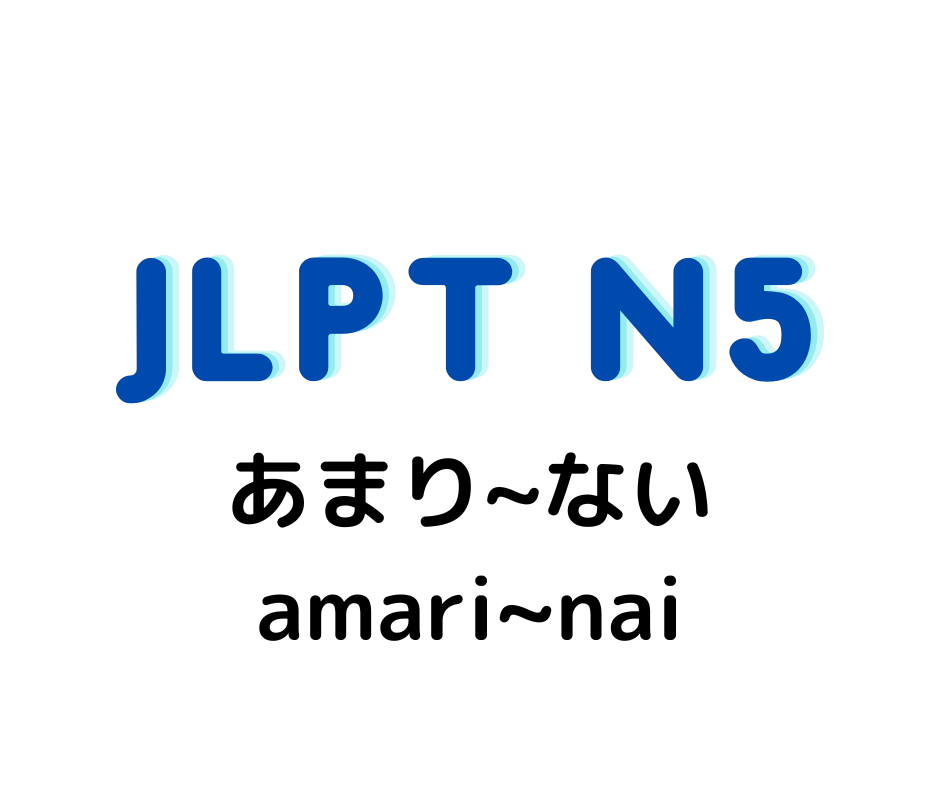sentence pattern:あまり~ない / amari~nai
【Grammar Type】
Degree Adverb
【Essential Meaning】
(Not) very / (Not) very much
【Construction】
あまり + Negative Predicate
E.g. あまり話はなさない
amari hanasanai [X doesn’t speak very much]
E.g. あまり食たべない
amari tabenai [X doesn’t eat very much]
E.g. あまり高たかくない
amari takakunai [X is not very expensive]
E.g. あまり元気げんきじゃない
amari genkijanai [X is not very healthy]
NOTE
- あまり is an adverb that is typically paired with a negative verb to mean “Not very” or “Not very much“.
- E.g. あまり寒くない [Not very cold]
- Other adverbs that pair with negative predicates include ぜんぜん [zenzen/ Not at all]、めったに [mettani/ Seldom]、けっして [kessite/ By no means]、さっぱり [sappari/ Not at all]、すこしも [sukosimo/ Not a bit]、and ちっとも [chittomo/ Not a bit].
- あまり may also be paired with a positive predicate in certain situations to mean “too much“. This tends to convey a negative or disapproving tone, and is often used in imperative situations (i.e. “Don’t do X too much.”)
- E.g. マークはあまり酒を飲んだので病気になった。
- ma-ku wa amari sake wo nonda node byouki ni natta. [Because Mark drank too much, he got sick.]
- E.g. それはあんまりです。
- sorewa anmari desu. [That’s too much. / You’re too cruel.]
- E.g. あんまり調子に乗るな!
- anmari chousi ni noruna. [Don’t ride the rhythm too much (i.e. don’t get too cocky)!]
- E.g. マークはあまり酒を飲んだので病気になった。
- あんまり is a slightly more conversational equivalent to あまり. You may also hear it further shortened to あんま.
- E.g. あんまり寒くない
- anmari samukunai [Not very cold]
- E.g. あんま寒くない
- anma samukunai [Not very cold]
- E.g. あんまり寒くない
Example sentences
fiil cümlesi
- あまりFacebookは使いません。
- amari Facebook wa tsukai masen.
- I don’t use Facebook much.
- すみません。あまりテレビは見ないので、その話はわかりません。
- sumimasen. amari terebi wa minainode, sono hanasi wa wakarimasen,
- I’m sorry. I don’t watch TV much, so I don’t know what you’re talking about.
- ホラー映画は苦手ですから、あまり見ません。
- hora- euga wa nigate deskara, amari mimasen.
- I don’t like horror movies, so I don’t watch them much.
- 昨日はあまり勉強しませんでした。
- kinou wa amari benkyou simasendesita.
- I didn’t study much yesterday.
- 休みの日はあまり外に出ません。
- yasumino hi wa amari soto ni demasen.
- I don’t go out much on my days off.
i adjective sentence
- この映画はあまり面白くないです。
- kono eiga wa amari omosiroku naidesu.
- This movie is not very interesting.
- ここの料理はあまり美味しくないですが、とても安いです。
- kokonoryouriwa amari oisikunai desuga, totemo yasuidesu.
- The food here is not very good, but it is very cheap.
- ひらがなはあまり難しくないですが、カタカナは難しいです。
- hiragana wa amari muzukasikunai desuga, katakana wa muzukasii desu.
- Hiragana is not too difficult, but katakana is difficult.
Na adjective sentence
- 私の国の電車はあまり便利じゃありません。
- watasi no kuni no densya wa amari benri jaarimasen.
- The trains in my country are not very convenient.
- 猫はあまり好きじゃありません。
- neko wa amari suki jaarimasen,
- I don’t really like cat.
- このあたりはあまり静かじゃありませんね。
- konoatari wa amari sizuka jaarimasen ne.
- It’s not very quiet around here.
- 日本語があまり上手じゃありませんから、英語で話してもいいですか。
- nihongo ga amari jyouzu jaarimasen kara, eigo de hanasitemo iidesuka.
- My Japanese is not very good, can I speak in English?



コメント
Very nice post. I definitely appreciate this site. Stick with it!
Good post. I learn something totally new and challenging on blogs I stumbleupon on a daily basis. Its always useful to read content from other authors and practice something from their websites.